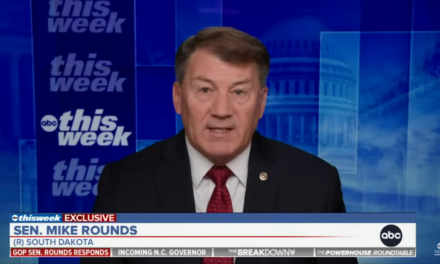We support our Publishers and Content Creators. You can view this story on their website by CLICKING HERE.
The New York Times recently dropped its latest “bombshell scandal” involving President-elect Donald Trump’s defense secretary nominee Pete Hegseth — and it’s about as vapid and toothless as one would expect.
“They’re desperately searching for anything to malign Pete,” Hegseth’s lawyer Tim Parlatore told The Federalist.
Published on Monday by Times lackies Dave Philipps and Sharon LaFraniere, the hit piece takes aim at Hegseth’s security guard John Jacob Hasenbein, a former Army Special Forces master sergeant. Specifically, the left-wing propagandists detailed a prior Army training incident involving Hasenbein that they ominously characterize as “a dark episode in his past.”
The matter came about during a March 2019 training simulation the Army conducted with a private contractor before Hasenbein’s unit was set to deploy overseas. The master sergeant and his team were tasked with carrying out “a hostage rescue from a terrorist cell,” and the contractor hired a civilian role player to portray “an ISIS fighter with information about a hostage whom Mr. Hasenbein’s team was supposed to free,” according to the Times.
Philipps and LaFraniere cited claims from witnesses that Hasenbein “beat” the role player — including the role player himself, who told the Times the soldiers “were supposed to ask [him] where the hostage is at … But they didn’t give [him] a chance. They just started hurting [him] bad.”
The authors noted how Hasenbein was subsequently charged by the Army with aggravated assault and reckless endangerment. As described in the report, “A military jury found him guilty of the assault charge in a court-martial in 2020 … But the judge overseeing the case declared a mistrial after learning that a friend of Mr. Hasenbein had been talking to a juror throughout the trial.”
While the left-wing activists portray the matter as an open and shut case, court records and documents obtained by The Federalist show there’s far more to the story than the Times lets on.
Unlawful Command Influence
One of the most glaring pieces of information omitted from Philipps and LaFraniere’s hit piece is testimony from two witnesses of the incident and examination of Hasenbein’s claim, as summarized by the authors, “that a commander had pressured [these] two soldiers to change their statements that nothing wrong had happened during the episode.”
According to the court overseeing the case, Master Sergeant Daniel Ewald and Sergeant First Class Brent Bacon were interviewed about the training incident in April 2019 by Captain Thomas Krakowiak, who “was appointed as an Investigating Officer (IO) … to determine the facts and circumstances surrounding the alleged injury.” Krakowiak showed both troops a three-minute video of the incident “recorded with night vision equipment.”
Ewald testified “that the video did not influence his recollection of the events, and that at the time he witnessed the incident, he believed he did nothing wrong, and no one else (including [Hasenbein]) did anything wrong.” Bacon similarly said he “believed no one did anything wrong during the exercise (to include [Hasenbein]),” and noted that “he specifically recalled that the only people saying the ‘safe word’” training participants were given to pause the exercise to address potential safety concerns “were Americans who were asking the role player whether he wanted to say the safe word.”
In September 2019, the General Court-Martial Convening Authority (GCMCA) — who referred Hasenbein’s case to trial — issued General Officer Memoranda of Record (GOMOR) to Ewald and Bacon. According to the Army, these memoranda are letters of reprimand “written by a general officer concerning a Soldier under his or her command” and come in two classifications: local and permanent.
A locally filed GOMOR “can be seen by the Soldier’s chain of command, but not by a promotion board, and it will be removed after a change of duty station or after 3 years, whichever is sooner.” Meanwhile, a permanently filed GOMOR can be viewed by promotion boards and will remain on a soldier’s record “unless it is appealed for removal or transferred to the restricted portion of the [Army Military Human Resource Record].”
In its GOMOR, the Convening Authority accused Ewald and Bacon of “fail[ing] to intervene when a fellow team member assaulted a civilian role-player who was not wearing any protective gear,” “misrepresent[ing] [their] actions and the role-player’s use of the safe-word and plea for help,” and “stat[ing] the role-player never used the safe word, even though you knew that to be false, and fail[ing] to state the role-player expressed distress during the assault.”
The following month, Ewald and Bacon issued rebuttals accepting responsibility for allegedly failing to intervene to stop the training exercise. According to the court, both did so, in part, to avoid potential permanent memoranda filings that harm their respective careers.
In a Feb. 27, 2020, ruling, Judge Jacqueline Tubbs found that Ewald’s rebuttal “was shaped by the GCMCA’s reprimand,” and that “[h]e believed the GCMCA expected him to take responsibility for the conduct in the GOMOR.” She similarly noted how “[p]art of the reason [Bacon] accepted responsibility was out of fear of receiving a permanent filing if he did not do so.”
Tubbs ultimately determined that Hasenbein met his “burden of providing evidence that [unlawful command influence] UCI occurred,” and that the Convening Authority’s “action of initiating GOMORs to two key-eyewitnesses … created the appearance of unlawful command influence” that risks jeopardizing the fairness of the trial.
“[T]he Government failed to prove that the actions of the GCMCA would not prejudice the proceedings or place an intolerable strain on the military justice system by casting a significant doubt about the fairness of the proceedings,” Tubbs wrote. “His actions will have, and create the appearance of having, an impermissible effect on the witnesses’ testimony and the trial, and therefore constitute actual and apparent unlawful command influence.”
Tubbs prohibited the government from further cross-examining Ewald and Bacon and “calling any witness to attack [their] credibility.” She also barred the government from “introducing any evidence” regarding the memoranda issued to the two soldiers, “information contained in the rebuttal matters of either Soldier, or evidence that either witness ‘accepted responsibility’ for their action or inaction in the incident.”
While Tubbs denied Hasenbein’s motion to toss the charges based on the UCI, she ordered that he receive “latitude in any witnesses that are called” and disqualified the Convening Authority “from taking post-trial action in this case.”
Mistrial and Aftermath
Those weren’t the only facts Philipps and LaFraniere left out of their hit piece, however. The authors also neglected to provide concrete information about the mistrial resulting in the dismissal of Hasenbein’s aggravated assault charge.
In her April 9, 2020, decision, Tubbs revealed how one of the jurors, Command Sergeant Major Toby Kammer, violated court rules by “communicating with” a fellow military official about the case.
The court found that Kammer called Master Sergeant Clyde Whitmore — a friend of Hasenbein and Kammer — “at least twice prior to deliberations on findings, and again after the sentence was announced and court adjourned” with the knowledge that Whitmore knew Hasenbein. Kammer asked Whitmore “for his opinion on evidence that was presented” at trial and informed him “about the panel’s impressions of the Defense’s expert witness,” who argued that Hasenbein’s “use of knee strikes” during the training exercise “was reasonable.”
“[I]t sounds like it’s pretty normal to get real aggressive for you guys and train like you fight,” Kammer told Whitmore.
Whitmore also told Kammer that “they [the Accused and members of his team] were told to be more aggressive” prior to the training exercise and that he’s “been doing that same kind of training where we were told to be more aggressive and [he] took it very personal,” and “that’s what you strive for … being the most violent dude in the room.”
Tubbs noted how, “[e]ven though there is no evidence that CSM Kammer brought up the discussions he was having, or the extraneous information he was receiving, with the other [jurors], that extraneous information clearly impacted his deliberations” on the matter. “The actions of CSM Kammer, cast substantial doubt as to the fairness of the proceedings and placed an intolerable strain on the entire military justice system,” she wrote.
In their article, Philipps and LaFraniere incorrectly attributed Kammer’s “pretty normal” remark to Whitmore and did not quote from Tubbs’ explanation of how Kammer’s conduct jeopardized the fairness of the trial.
Hasenbein filed a defamation case against the military contractor who conducted the training simulation in December 2020, in which he claimed, as the Times described, “he was effectively forced out of the military because of false and misleading statements by employees of the independent contractor who conducted the exercise.” Hasenbein dropped the case after the two parties reached a settlement in September 2021.
The master sergeant retired from active duty and was honorably discharged in October 2021, according to his DD214 and other documents obtained by The Federalist.
“You spend your entire adult life devoted to this way of life and [the military], and to have it not only turn its back on you, but [to] actively try to destroy you, it’s disheartening,” Parlatore said of Hasenbein’s decision to retire.
Hegseth’s lawyer further noted how “even if you’re exonerated” like Hasenbein was, “the ability to get promoted is a little bit more difficult.”
Media Smear Campaign
Parlatore told The Federalist the Times’ latest hatchet job against Hasenbein — and by default, Hegseth — is demonstrative of how the media’s attempts to derail the latter’s defense secretary nomination have failed.
The Times published a hit piece last month authored by LaFraniere and Julie Tate that included a private 2018 email from Hegseth’s mother Penelope to her son about his prior extramarital affairs. While critical of Hegseth in the reported email, Penelope told the outlet she sent a follow-up email apologizing for the initial communique that she wrote “in anger [and] with emotion.”
Penelope more recently appeared on Fox News to defend her son and his character amid the media’s smear campaign.
The media have a “bizarre desire to try to find anything that can, in any way, be painted as negative about somebody [like Pete]. It’s just straight up mudslinging,” Parlatore said.
NBC News and The New Yorker are among those to partake in the Times’ anti-Hegseth crusade. Earlier this month, both left-wing outlets published anonymous allegations of wrongdoing by Hegseth during his time working at Fox News and spearheading veteran-related nonprofit organizations, respectively. Numerous former colleagues and associates have come out strongly disputing the accusations.
Shawn Fleetwood is a staff writer for The Federalist and a graduate of the University of Mary Washington. He previously served as a state content writer for Convention of States Action and his work has been featured in numerous outlets, including RealClearPolitics, RealClearHealth, and Conservative Review. Follow him on Twitter @ShawnFleetwood

 Conservative
Conservative  Search
Search Trending
Trending Current News
Current News 





